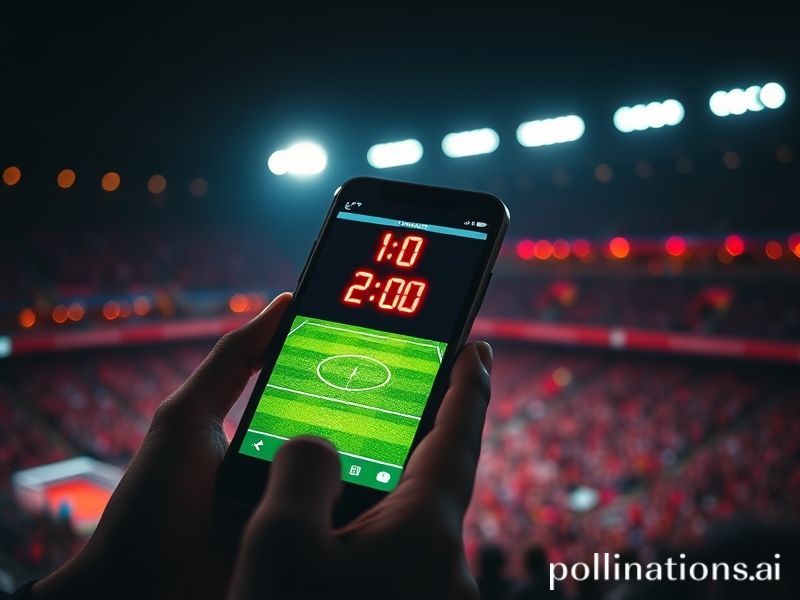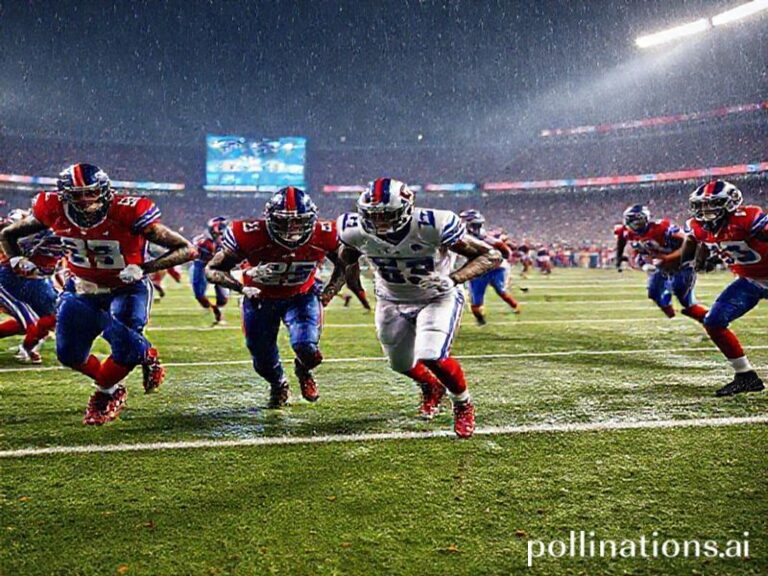Flashscore: How One App Turned the Planet into a 24-Hour Sweatshop of Football Anxiety
Flashscore: The Global Addiction Nobody Talked About At Davos
By Dimitri Valenzuela, Senior Correspondent-at-Large
There’s a quiet pandemic spreading faster than the last one (and arguably with fewer masks). It isn’t carried by bats, lab leaks, or rogue influencers. It’s called Flashscore, a pocket-sized dopamine IV drip that has turned every human with a smartphone into a chain-smoking football oracle who can tell you the possession stats for a Moldovan third-tier derby at 3 a.m. local time.
From Lagos to Lima, from the smoking lounges of Dubai to the damp bus shelters of Glasgow, the same pale glow illuminates a billion faces. There, in the blue-white light, civil wars pause for injury-time updates, first dates pivot on whether the 89th-minute corner is cleared, and stockbrokers in Singapore place buy orders milliseconds after a red card in the Brasileirão. The app’s servers hum somewhere in Central Europe—nobody knows exactly where, probably next to a Cold-War bunker full of Austrian tax-evaders—processing 1,700 matches simultaneously. That’s more live data flows than most governments handle on tax day.
The genius, of course, is that Flashscore doesn’t actually play the matches. It simply harvests anxiety and repackages it as “real-time engagement.” One push notification—GOAL! 1-1, 90+4’—and an entire continent exhales. The same alert also triggers a 3 % spike in Nairobi sports-bar beer sales, a 12 % dip in Jakarta scooter accidents (everyone’s staring at screens), and a 0.0001 % uptick in the Latvian suicide rate because someone’s accumulator just imploded. Economists call it “externalities.” The rest of us call it Tuesday.
Bookmakers love Flashscore the way hyenas love dying zebras. Live odds recalibrate faster than central banks can print excuses, and suddenly that friendly Tuesday night between Dnipro-1 and Zorya Luhansk becomes a derivatives market for people who failed math. Entire hedge funds now employ “latency arbitrage” algorithms that shave milliseconds off Flashscore’s feed to beat the house. If you think capitalism died with the factory whistle, tune in to a Maltese FA Trophy quarter-final and watch the invisible hand pick your pocket.
Meanwhile, geopolitics has discovered the platform’s soft power. When Saudi Arabia bought Newcastle United, the club’s fixture list briefly trended above Yemen’s humanitarian crisis on global Flashscore traffic. Somewhere in Riyadh, a minister noted the KPI with the satisfied smile of a man who just weaponized offside traps. China, not to be outdone, has rolled out its own state-approved knock-off, “FlashRedFlag,” where every score is morally uplifting and all time-wasting is reported to the nearest party cadre.
Human resources departments report a 20 % drop in productivity during AFCON, Copa América, and that charming two-week window when the Euros overlap with the Gold Cup, creating a 24-hour Mexican wave of procrastination. HR calls it “work-life balance.” Middle managers call it “the reason we missed Q3 targets.” The workers themselves—bless their biologically tethered souls—call it “research.”
Yet for all the cynicism, there’s something grimly democratic about Flashscore. A goat herder in the Atlas Mountains with a cracked Huawei can watch the same Stuttgart corner as the Bayern Munich club doctor in his lakeside villa. The feed is egalitarian; the despair is universal. Whether you earn your living selling knock-off sunglasses on Copacabana or insider tips in Mayfair, the 93rd-minute equalizer hits like cosmic justice—random, merciless, and absolutely hilarious if it’s not your mortgage on the line.
And so the planet spins, propelled not by fossil fuels or renewable hope but by the endless refresh of a little blue circle. Tomorrow there will be more matches, more alerts, more micro-doses of manufactured destiny. Flashscore won’t cure cancer or reverse the climate spiral. But it will let you know that the Faroe Islands just scored a stoppage-time winner against Liechtenstein, which, in a world hurtling toward existential cliff-edges, feels almost heroic.
If that isn’t progress, I don’t know what is—probably because the app crashed before I could check.







